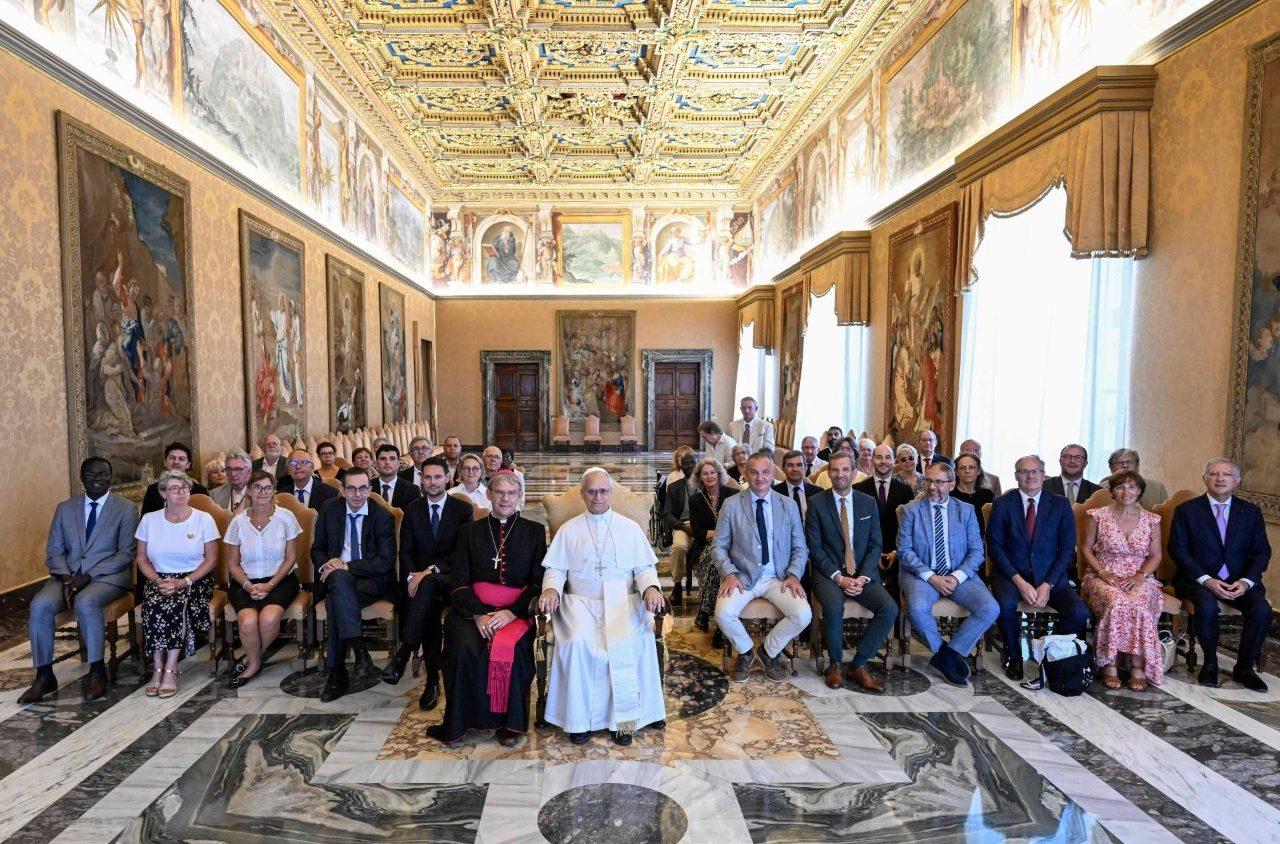While meeting politicians from France, Pope Leo XIV emphasized the importance of “turning to Christ” in fulfilling their obligations in government.
The pontiff was speaking to elected officials and civil servants from the Diocese of Créteil, on pilgrimage to Rome on Aug. 28. The diocese is located just a few miles from the French capital city of Paris.
“I am happy to welcome you in your journey of faith: You will return to your daily commitments strengthened by hope, better established to work to build a more just, more humane, and more fraternal world, which can be nothing other than a world more imbued with the Gospel,” Leo said.
“Faced with the different excesses that our Western societies are experiencing, we can do nothing better, as Christians, than to turn to Christ and ask for his help in exercising our responsibilities,” he added.
It is notable that Leo was speaking to government officials of an officially secular nation, where the constitutional principle of Laïcité has imposed a strict separation of Church and State in the nominally Catholic-majority nation.
In his address to the politicians, Leo said France had a “sometimes misunderstood secularism” which made it difficult for elected officials “to act and make decisions consistent with their faith in the exercise of their public responsibilities.”
“The salvation that Jesus obtained through his death and resurrection encompasses all dimensions of human life, such as culture, the economy and work, family and marriage, respect for human dignity and life, health, as well as communication, education, and politics,” the pope said.
“Christianity cannot be reduced to a simple private devotion, for it implies a way of living in society imbued with love for God and for one’s neighbor, who, in Christ, is no longer an enemy but a brother,” he continued.
Créteil has a large foreign-born population, with over a quarter of its members having been born outside of continental France. It has often experienced crime and homelessness.
Leo noted the region of the diocese “is faced with major social issues such as violence in certain neighborhoods, insecurity, precariousness, drug networks, unemployment, the disappearance of conviviality.”
“To face these challenges, the Christian leader is strengthened in the virtue of charity which has inhabited him since his baptism,” the pope told the politicians.
He quoted the Compendium of the Social Doctrine of the Church, saying this is a gift from God, “a force capable of inspiring new ways of approaching the problems of today’s world, of profoundly renewing structures, social organizations, legal systems from within … In this perspective love takes on the characteristic style of social and political charity: Social charity makes us love the common good, it makes us effectively seek the good of all people.”
Leo said this is why the Christian leader is better prepared to face the challenges of the present world, “to the extent, of course, that he lives and bears witness to his active faith in it, to his personal relationship with Christ who enlightens him and gives him this strength.”
He said Jesus stated it forcefully in the Gospel of John: “Without me you can do nothing!”
“It should therefore come as no surprise that the promotion of ‘values,’ however evangelical they may be, but ‘emptied’ of Christ as their author, are powerless to change the world,” the pope told the French officials.
“The first — and only — advice I will give you is to unite yourselves more and more to Jesus, to live by Him and bear witness to Him,” Leo said.
“There is no separation in the personality of a public figure: There is not the politician on one side, and the Christian on the other. But there is the politician who, under the gaze of God and his conscience, lives out his commitments and responsibilities in a Christian manner,” he continued.
The pontiff told the French officials that they are called to strengthen themselves in faith, to deepen y their understanding of the doctrine — especially the social doctrine — “that Jesus taught the world, and to put it into practice in the exercise of your responsibilities and in the drafting of laws.”
“Its foundations are fundamentally in accord with human nature, the natural law that all can recognize – even non-Christians; even non-believers,” he said.
He told the French officials they must not be afraid to propose and defend the natural law with conviction: “It is a doctrine of salvation that aims for the good of every human being, the building of peaceful, harmonious, prosperous, and reconciled societies.”
“I am well aware that the openly Christian commitment of a public official is not easy, particularly in certain Western societies where Christ and his Church are marginalized, often ignored, and sometimes ridiculed,” Leo said.
“Nor am I unaware of the pressures, party orders, and ‘ideological colonizations’ — to borrow a fitting expression from Pope Francis — to which politicians are subjected. They need courage: the courage to sometimes say ‘No, I can’t!’ when the truth is at stake,” he said.
“Here again, only union with Jesus – Jesus crucified! – will give you the courage to suffer for his name,” the pope continued.
Leo ended his address by telling the French officials to maintain their hope for a better world; “remain certain that, united with Christ, your efforts will bear fruit and be rewarded.”
Follow Charles Collins on X: @CharlesinRome









